Dux-Soup Alternatives
Considering a switch from Dux-Soup? This guide compares 10 alternatives, analyzing features and pricing to help you make an informed decision.

You might know Dux-Soup as a tool for LinkedIn outreach and social selling. It performs well when it comes to the automation of repetitive tasks, which saves a lot of time during lead generation.
But like any tool, it has limits. Some users mention an inefficient workflow, difficulties with campaign management, and occasional billing issues. This might lead you to look for alternatives. We've analyzed the top options to help you decide. Let's get started.
Consider 11x for Your Sales Team
If your team is exploring the use of digital workers for sales tasks, 11x presents a different approach. It focuses on deploying autonomous agents to handle parts of the sales process, which might fit your operational model.
11x is a go-to-market platform that uses AI agents to manage the sales process. These agents operate autonomously to execute various sales functions.
For example, an agent named Alice finds prospects, manages email and LinkedIn outreach, and maintains the CRM. A second agent, Julian, qualifies inbound leads and books meetings.
The platform consolidates the tech stack. It integrates capabilities for data enrichment, outreach, and email warmup, which can replace the need for separate point solutions.
Dux-Soup Alternatives
Here is a detailed review of Dux-Soup alternatives. Each option is analyzed based on its pricing, core features, and how it stacks up against Dux-Soup in terms of benefits and potential drawbacks.
1) Linked Helper
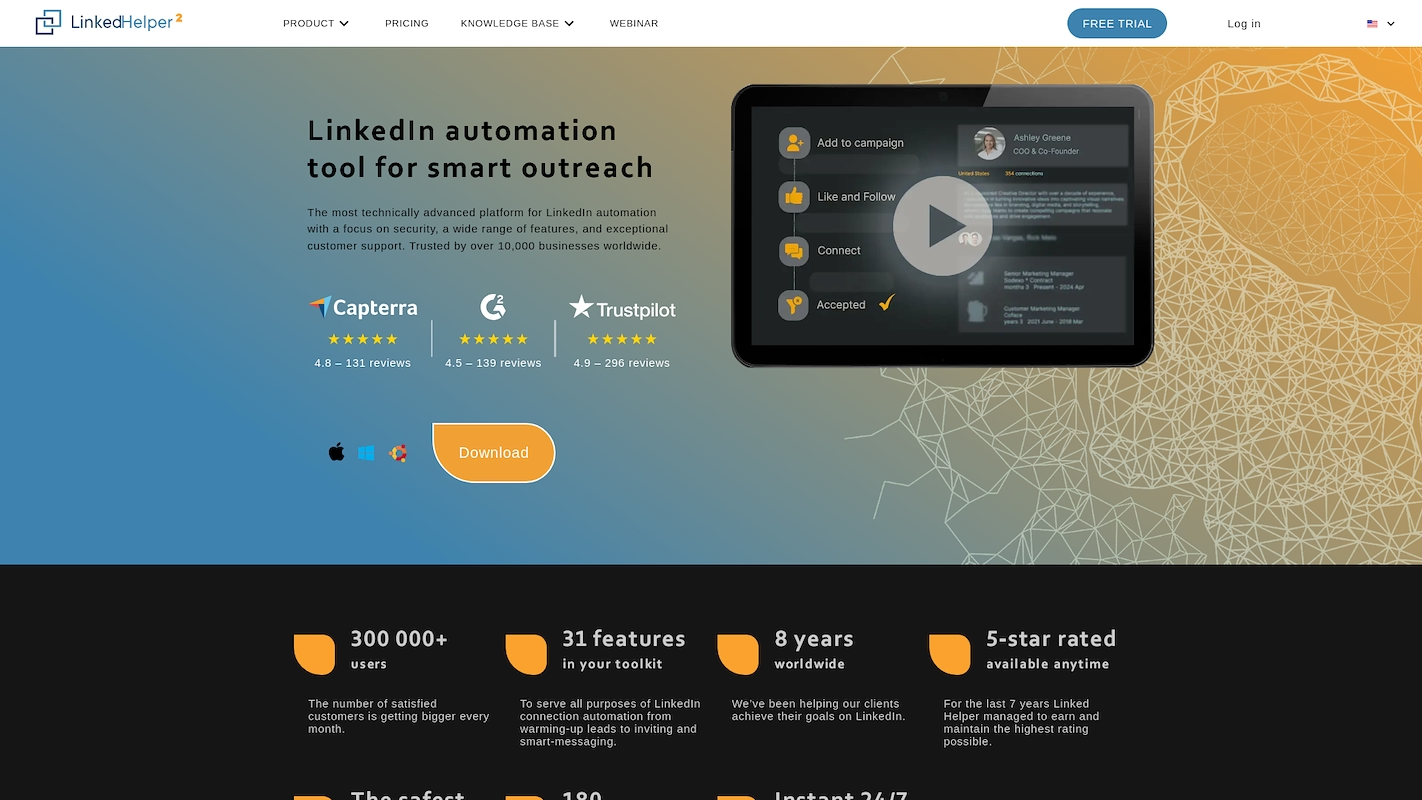
Linked Helper is a downloadable desktop application for LinkedIn outreach and lead generation. It operates as a standalone app for security, not a browser extension. The tool automates tasks, sends connection requests, and executes follow-up message sequences.
It also harvests emails to enrich LinkedIn leads for multichannel outreach. The platform has operated for over eight years and serves more than 10,000 companies across 180 countries.
Linked Helper's Main Features
- Builds drag-and-drop workflows that combine actions like profile visits, follows, endorsements, and messages.
- Uncovers up to 95% of emails for 2nd and 3rd-degree connections, with included monthly credits based on the plan.
- Creates audiences from various LinkedIn sources, including Sales Navigator, Recruiter, groups, and post engagers.
- Stores all processed contacts, interaction history, tags, and notes within a built-in CRM.
How Linked Helper Compares to Dux-Soup
Average Review score: 4.6/5 stars based on 144 G2 reviews.
- Linked Helper operates as a standalone application, not a browser extension like Dux-Soup. This architecture is designed for increased safety by mimicking human behavior without injecting code into LinkedIn pages.
- It provides a visual, drag-and-drop workflow builder. This allows for more complex automation sequences than the campaign structure in Dux-Soup, which can be more rigid.
- The platform includes a built-in CRM to manage contacts, interaction history, and notes internally. This offers a more unified system compared to Dux-Soup, which often requires exporting data to an outside CRM.
- You can manage multiple LinkedIn accounts from one place. This is a distinct advantage for agencies or large teams, whereas managing several accounts with Dux-Soup can be less straightforward.
Where Linked Helper May Fall Short
- Linked Helper is a desktop application, which means your computer must be running for it to work. In contrast, Dux-Soup has a cloud-based option that runs campaigns independently.
- Some users report a steeper learning curve with Linked Helper. Its workflow builder is powerful but can be more complex to set up than Dux-Soup's more straightforward campaign creation process.
- It does not have a free plan. Dux-Soup offers a free version for basic automation, which allows users to test the tool without a financial commitment.
Pricing and Cost-Effectiveness
Linked Helper's Standard plan is $15 per month, while its PRO plan is $45 per month. This makes its entry-level plan slightly more expensive than Dux-Soup's Pro plan at $11.25, and its advanced plan is comparable to Dux-Soup's Turbo plan at $41.25.
2) Phantombuster
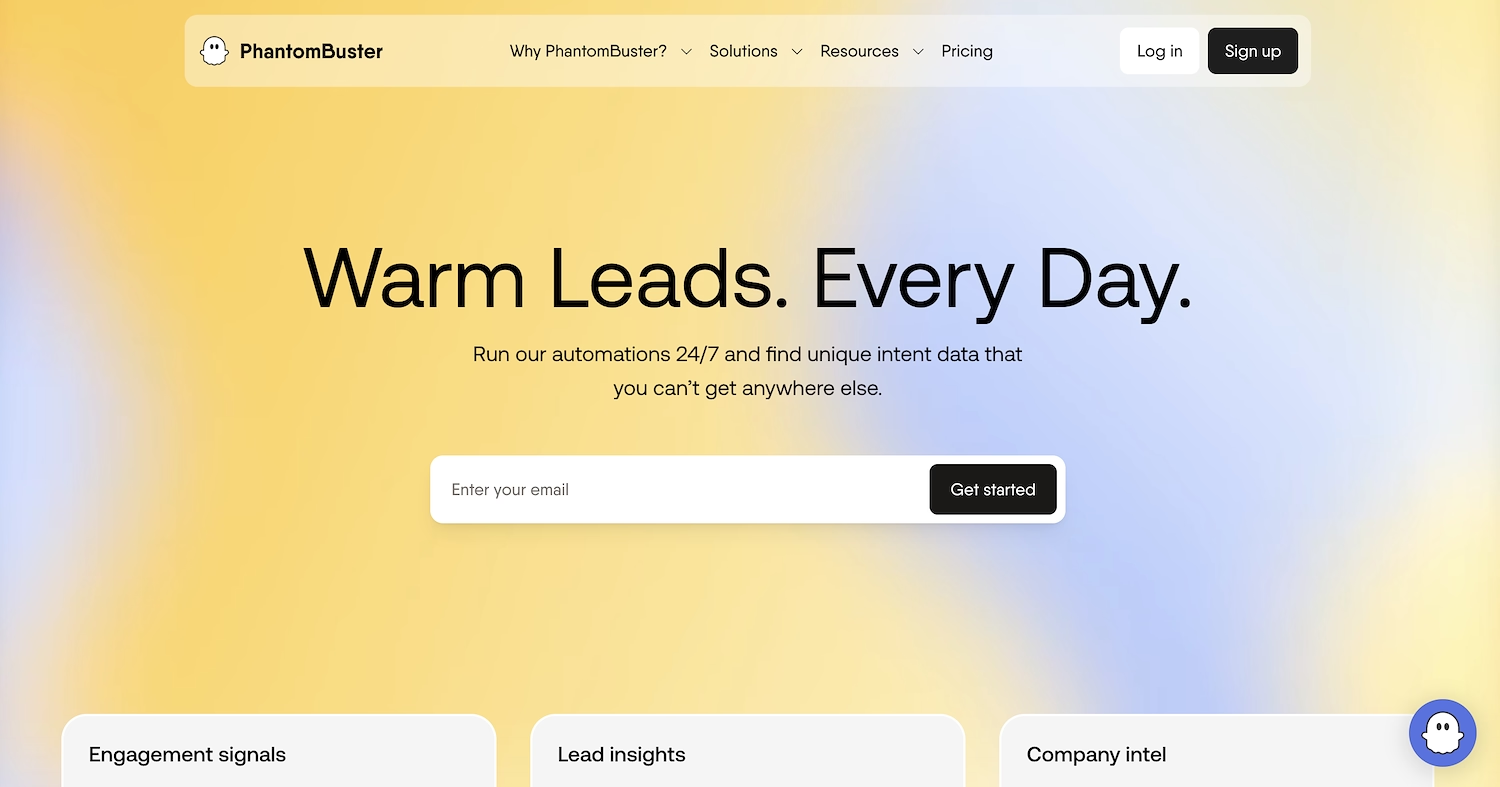
Phantombuster is a tool for data extraction and process automation on the web. It uses individual automations, called "Phantoms," to perform tasks like lead generation and audience building across various social media sites.
The platform offers pre-built workflows to connect sequences of actions. This approach allows teams to collect data and automate outreach without manual intervention. It works from the cloud for continuous operation.
Phantombuster's Main Features
- Extracts data and automates processes using individual automations called "Phantoms."
- Automates tasks for lead generation and audience building across various social media sites.
- Connects sequences of actions with pre-built workflows for more complex automation.
- Runs automations from the cloud, which allows for continuous operation.
How Phantombuster Compares to Dux-Soup
Average Review score: 4.3/5 stars based on 97 G2 reviews.
- Phantombuster automates actions on multiple websites, including Twitter, Instagram, and Google Maps. This provides more data sources for lead generation than Dux-Soup, which operates mainly on LinkedIn.
- The platform uses individual automations called "Phantoms" that you can link together in workflows. This modular system allows for more customized automation sequences compared to the more structured campaign builder in Dux-Soup.
- It is built for broad data extraction from various online platforms. While Dux-Soup also scrapes data, Phantombuster's functionality is designed for a wider range of websites beyond social networks.
- This tool operates fully in the cloud, so automations run 24/7 without your computer being on. This is different from Dux-Soup's primary model as a browser extension, although Dux-Soup does offer a cloud plan.
Where Phantombuster May Fall Short
- Phantombuster's workflow system can be complex for simple outreach tasks. In comparison, Dux-Soup provides a more direct campaign builder that is often quicker to set up for standard LinkedIn automation.
- The tool does not offer a free plan to test its core functionality. Dux-Soup has a free version, which lets new users evaluate the tool's basic features before making a financial commitment.
- Its automations are less integrated with the live LinkedIn interface. As a browser extension, Dux-Soup allows you to manage tasks directly from LinkedIn pages, which some users find more intuitive for sales workflows.
Pricing and Cost-Effectiveness
Dux-Soup’s pricing starts at $11.25 for the Pro plan and $41.25 for the Turbo plan per month. Phantombuster is generally considered a higher-cost option; for the most accurate pricing, it is best to check Phantombuster's official website.
3) Octopus CRM
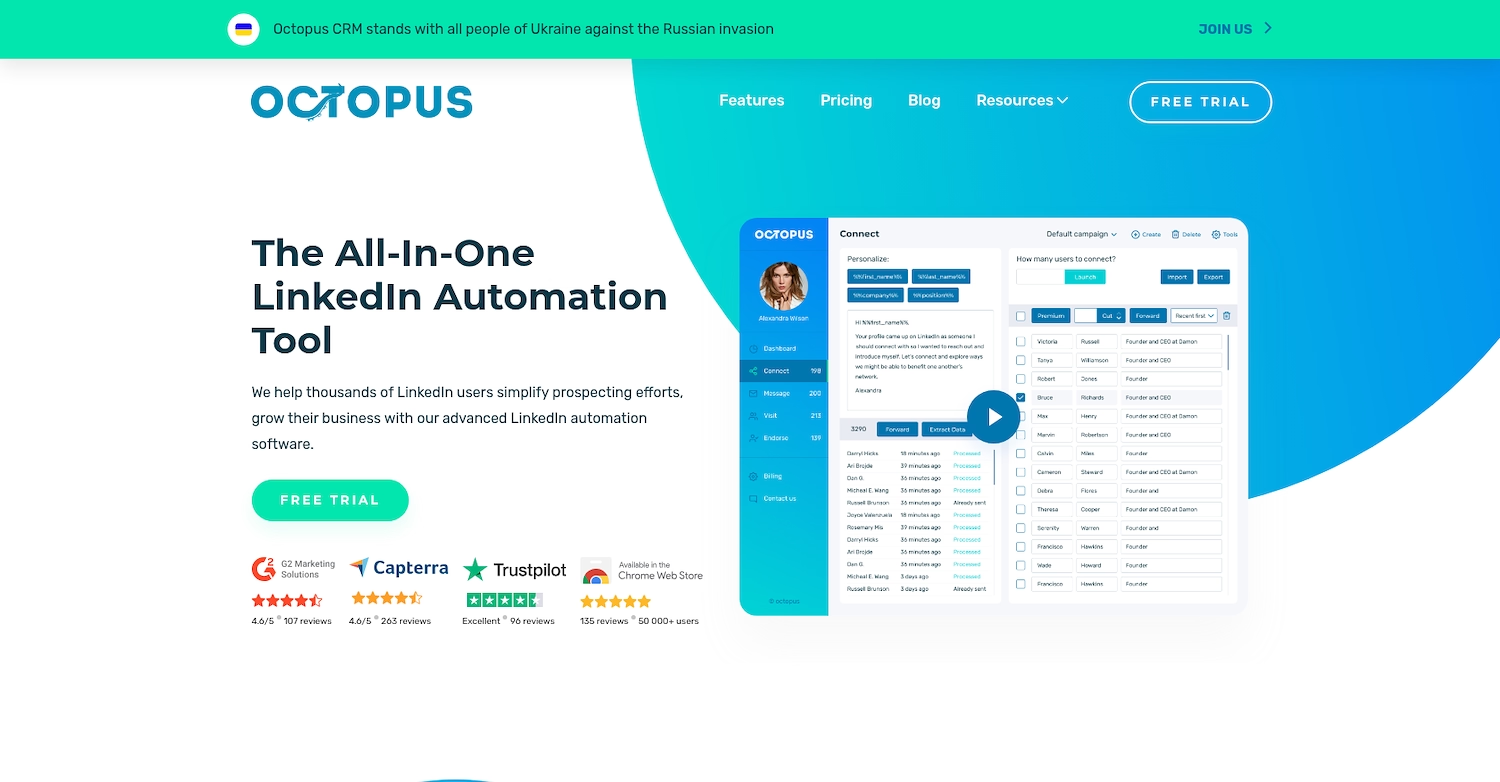
Octopus CRM is a LinkedIn automation tool and mini-CRM delivered as a Chrome extension. It helps build outreach funnels to connect with prospects, send messages, and endorse skills. The tool includes safety controls to work within LinkedIn limits and offers analytics to track performance. It is designed for business owners, marketing agencies, and sales teams.
Octopus CRM's Main Features
- Sends automated, personalized connection requests with an option to bypass LinkedIn’s weekly invite limit by using email.
- Builds multi-step LinkedIn funnels with a drag-and-drop campaign builder that strings actions together.
- Automatically visits profiles and endorses up to seven skills for each contact.
- Integrates with Zapier and HubSpot to push LinkedIn data into other applications like Google Sheets, Zoho, and Asana.
How Octopus CRM Compares to Dux-Soup
Average Review score: 4.4/5 stars based on 116 G2 reviews.
- Octopus CRM provides a visual funnel builder to create outreach sequences. This offers more flexibility compared to the campaign structure in Dux-Soup, which can be less adaptable for complex funnels.
- The tool allows you to bypass the weekly LinkedIn connection limit by sending requests via email, a feature not standard in Dux-Soup's process.
- It has an interface that many users find more intuitive and easier to set up than Dux-Soup, where some users report an inefficient workflow.
- Its entry-level plan is more affordable. The Starter plan for Octopus CRM is $6.99 per month, while Dux-Soup's Pro plan is $11.25 per month.
Where Octopus CRM May Fall Short
- Octopus CRM is a browser extension, so your computer must be running for it to operate. In contrast, Dux-Soup offers a cloud plan that runs campaigns 24/7 without needing your device to be on.
- The tool does not have a permanent free plan for basic automation. Dux-Soup provides a free version, which allows users to test core functions like profile visits before committing to a paid plan.
- Some users find its built-in analytics less comprehensive. Dux-Soup allows data exports that can be used with external analytics platforms for more detailed performance tracking.
Pricing and Cost-Effectiveness
Octopus CRM is more budget-friendly, with plans ranging from $6.99 to $24.99 per month. This makes its entry-level and top-tier plans more affordable than Dux-Soup's Pro ($11.25) and Turbo ($41.25) options. For the most current information, check the detailed pricing on Octopus CRM's official website.
4) Meet Alfred
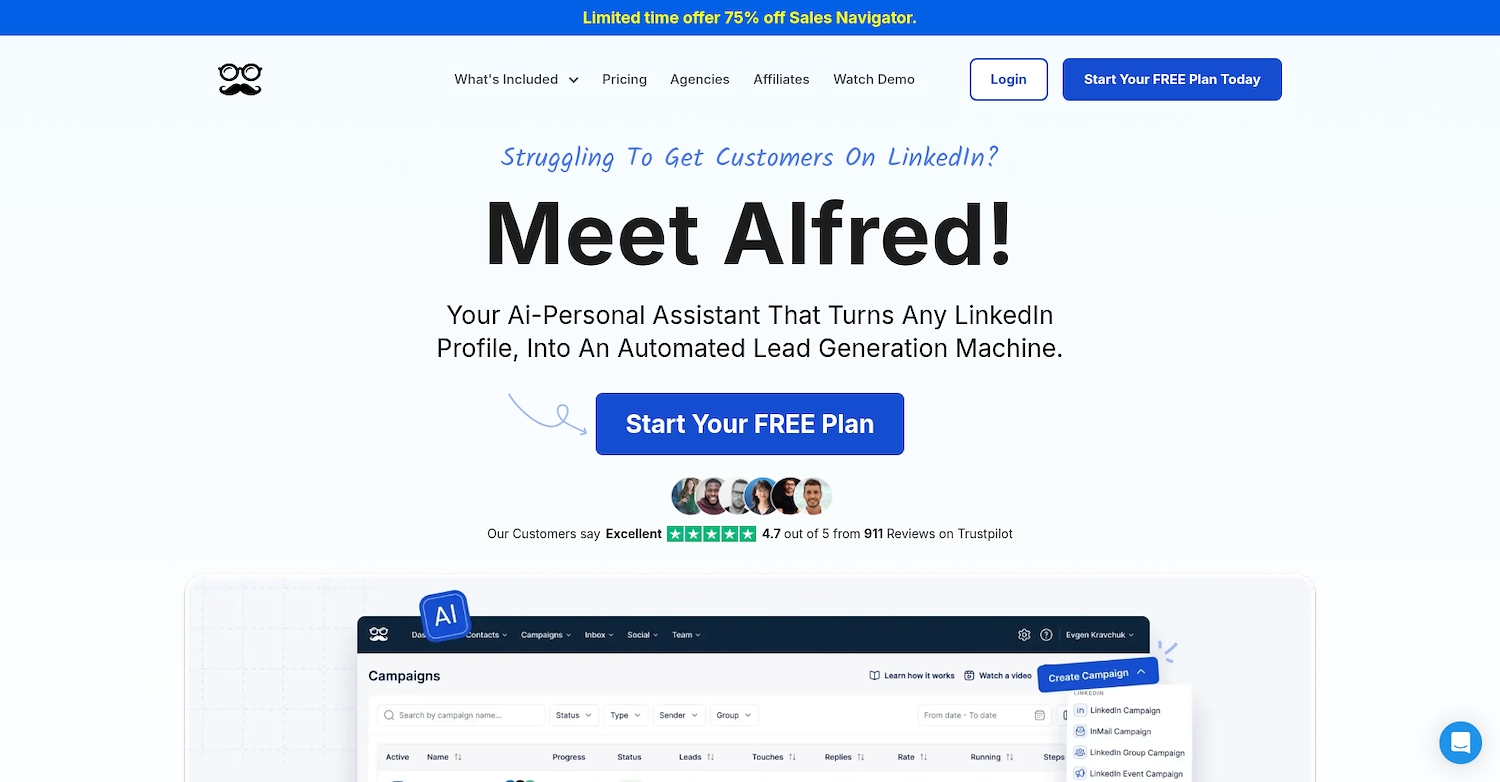
Meet Alfred is a sales enablement tool for multi-channel outreach on LinkedIn, email, and Twitter. It automates campaigns for lead generation and social selling, and includes a built-in CRM for contact management. The system helps sales teams generate conversations and opportunities through automated, multi-platform sequences.
Meet Alfred's Main Features
- Creates multi-channel campaigns that combine outreach on LinkedIn, email, and Twitter (X) into a single automated sequence.
- Includes a social media post scheduler to plan and automate content on social platforms.
- Offers a white-label solution that allows agencies to provide the service under their own brand.
- Provides team collaboration tools, including role assignments, shared inboxes, and team-level analytics.
How Meet Alfred Compares to Dux-Soup
Average Review score: 3.3/5 stars based on 32 G2 reviews.
- Meet Alfred creates multi-channel campaigns that use LinkedIn, email, and Twitter. This provides a wider outreach capability than Dux-Soup, which operates primarily on LinkedIn.
- It includes team collaboration tools such as role assignments and shared inboxes. This offers a more structured approach for teams compared to Dux-Soup's account management.
- The tool has a social media post scheduler to automate content publishing. Dux-Soup does not offer a comparable feature for planning social media posts.
- This platform provides a white-label solution, which allows agencies to offer the service under their own brand. This option is not available with Dux-Soup.
Where Meet Alfred May Fall Short
- Some users report issues with LinkedIn detection from Meet Alfred. In comparison, Dux-Soup has safety features that mimic human behavior to reduce the risk of account flags.
- The tool does not offer a free plan to test its features. Dux-Soup, on the other hand, provides a free version for users to try basic automation before a purchase.
- Its pricing is not public, so potential users must contact sales. Dux-Soup offers transparent pricing on its website, which helps teams evaluate the cost.
Pricing and Cost-Effectiveness
Dux-Soup offers transparent pricing, with paid plans starting at $11.25 per month. Meet Alfred’s pricing is not public; for the most accurate information, we recommend visiting Meet Alfred's official website.
5) Zopto
Zopto is a cloud-based platform that automates LinkedIn lead generation for sales teams and agencies. It focuses on identifying and engaging with ideal customers through automated outreach sequences. The tool operates entirely from the cloud, so it runs continuously without local installation.
Zopto's Main Features
- Provides advanced filtering to target prospects by industry, location, title, and company size.
- Allows A/B testing of message templates to find the most effective outreach copy.
- Includes a dashboard with detailed analytics to track campaign performance and engagement rates.
- Offers features for managing multiple accounts, which is useful for agencies or large teams.
How Zopto Compares to Dux-Soup
Average Review score: 4.2/5 stars based on 103 G2 reviews.
- Zopto is a fully cloud-based solution, meaning it runs 24/7 without your computer being on. This is similar to Dux-Soup’s Turbo plan but is Zopto's standard operational model.
- It includes native A/B testing capabilities. This allows you to test different message variations within a campaign to optimize response rates, a feature not built into Dux-Soup.
- The platform is designed with agencies and larger teams in mind, offering robust account management and reporting features. Dux-Soup is often more suited for individual users or smaller teams.
- Zopto provides more granular filtering options for prospect lists directly within the tool. This can create more targeted campaigns than Dux-Soup's standard filtering.
Where Zopto May Fall Short
- Zopto is a premium-priced tool, which can make it less accessible for small businesses or solo entrepreneurs compared to Dux-Soup's more affordable entry-level plans.
- The platform's extensive features may present a steeper learning curve. Dux-Soup's simpler interface can be quicker to master for users with basic automation needs.
- It does not offer a free plan. Dux-Soup provides a free version that allows users to try core features before committing to a paid subscription.
Pricing and Cost-Effectiveness
Zopto is positioned as a higher-cost alternative, with plans typically starting at a much higher price point than Dux-Soup's Pro ($11.25) and Turbo ($41.25) plans. For current pricing details, it is best to consult Zopto's official website.
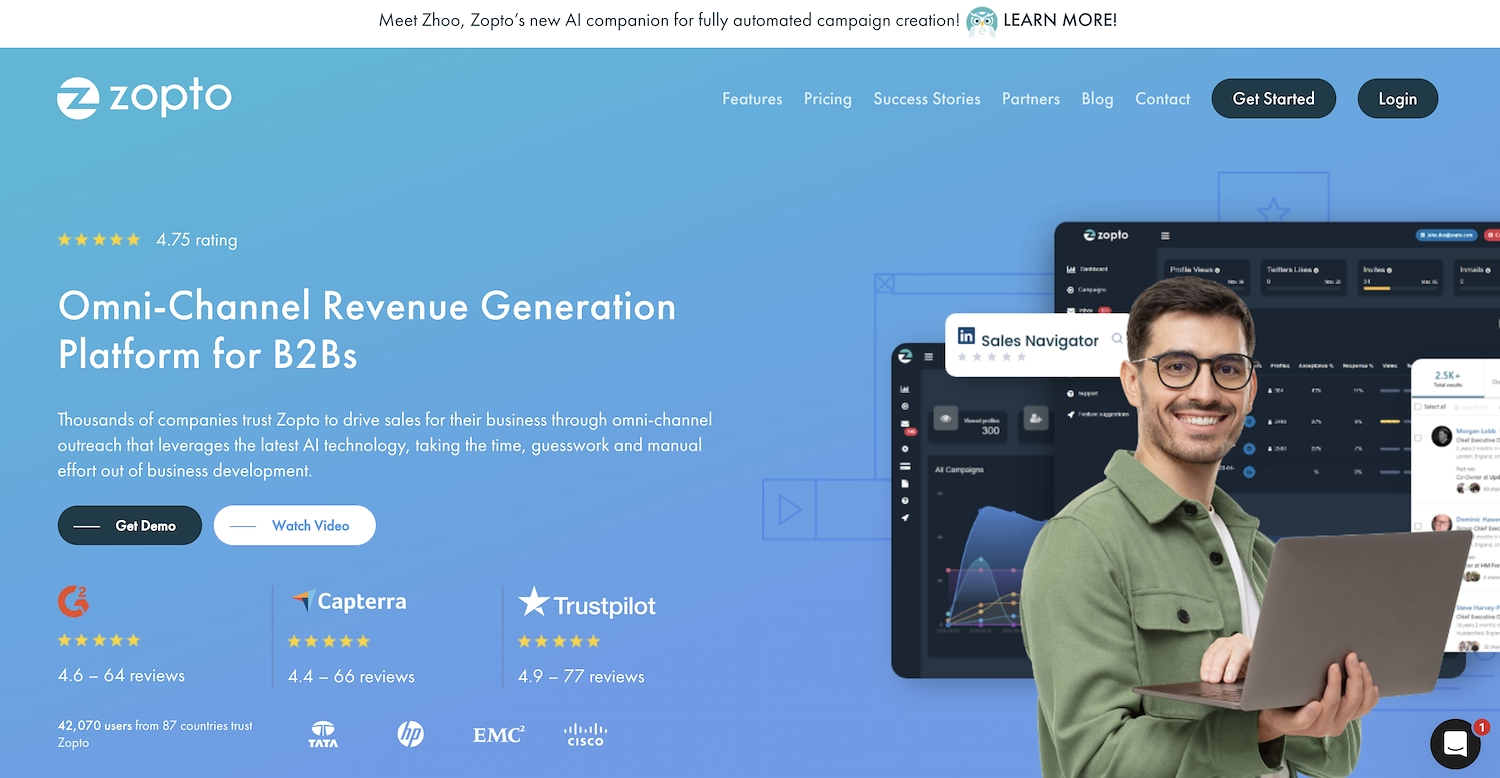
Zopto is a cloud-based platform for sales teams and agencies that automates LinkedIn lead generation. It uses automated outreach sequences to find and connect with ideal customers. The tool operates entirely from the cloud, which allows for continuous operation without any local installation.
Zopto's Main Features
- Uses a GPT-4–based tool, the Zhoo AI Assistant, to build campaigns, write templates, and auto-respond to messages.
- Combines LinkedIn actions with up to 5,000 verified email sends per month in omnichannel smart sequences.
- Automates and personalizes social media posts with a LinkedIn post scheduler and a ChatGPT-4 content generator.
- Operates from a cloud-based platform with dedicated IPs to help protect LinkedIn accounts.
How Zopto Compares To Dux-Soup
Average Review score: 4.5/5 stars based on 71 G2 reviews.
- Zopto includes a GPT-4 AI assistant to help with campaigns and messages, a feature that Dux-Soup lacks.
- It supports multi-channel outreach by combining LinkedIn actions with email sends, while Dux-Soup primarily focuses on LinkedIn.
- The platform includes a LinkedIn post scheduler, a content automation feature that is not part of Dux-Soup.
- Zopto enhances account safety with dedicated IP addresses, a more advanced security feature than the general protections in Dux-Soup.
Where Zopto May Fall Short
- Zopto may require a longer setup period. User data indicates an implementation time of about two months, which contrasts with Dux-Soup's browser extension that can be faster to deploy.
- Some users report issues with slow performance and software bugs. This can interrupt workflows, a contrast to Dux-Soup's direct browser integration which some find more stable for daily tasks.
- The platform operates entirely in the cloud, so you do not manage tasks directly on LinkedIn pages. This differs from Dux-Soup's extension, which some users prefer for its on-page workflow and direct interaction.
Pricing and Cost-Effectiveness
Dux-Soup offers transparent pricing with its Pro Dux plan at $11.25 and Turbo Dux at $41.25 per month. Zopto is positioned as a premium tool, and for the most accurate pricing information, we recommend visiting Zopto's official website.
Implement Digital Workers With 11x
The tools reviewed offer various ways to automate outreach. If your strategy is to deploy autonomous agents for sales functions, 11x provides a platform designed for that approach. It presents a different operational model.
Its digital workers handle tasks like prospect discovery, outreach, and lead qualification. To evaluate how this system could fit into your current sales process, you can learn more about 11x and its capabilities.
At 11x, we use AI to operate your sales playbook. Alice identifies accounts, enriches data, and manages outreach. Julian takes calls, qualifies prospects, and sets meetings. This approach replaces multiple tools in a traditional GTM stack, handling everything in one platform.
You can book a demo to see it in action.
6) Expandi
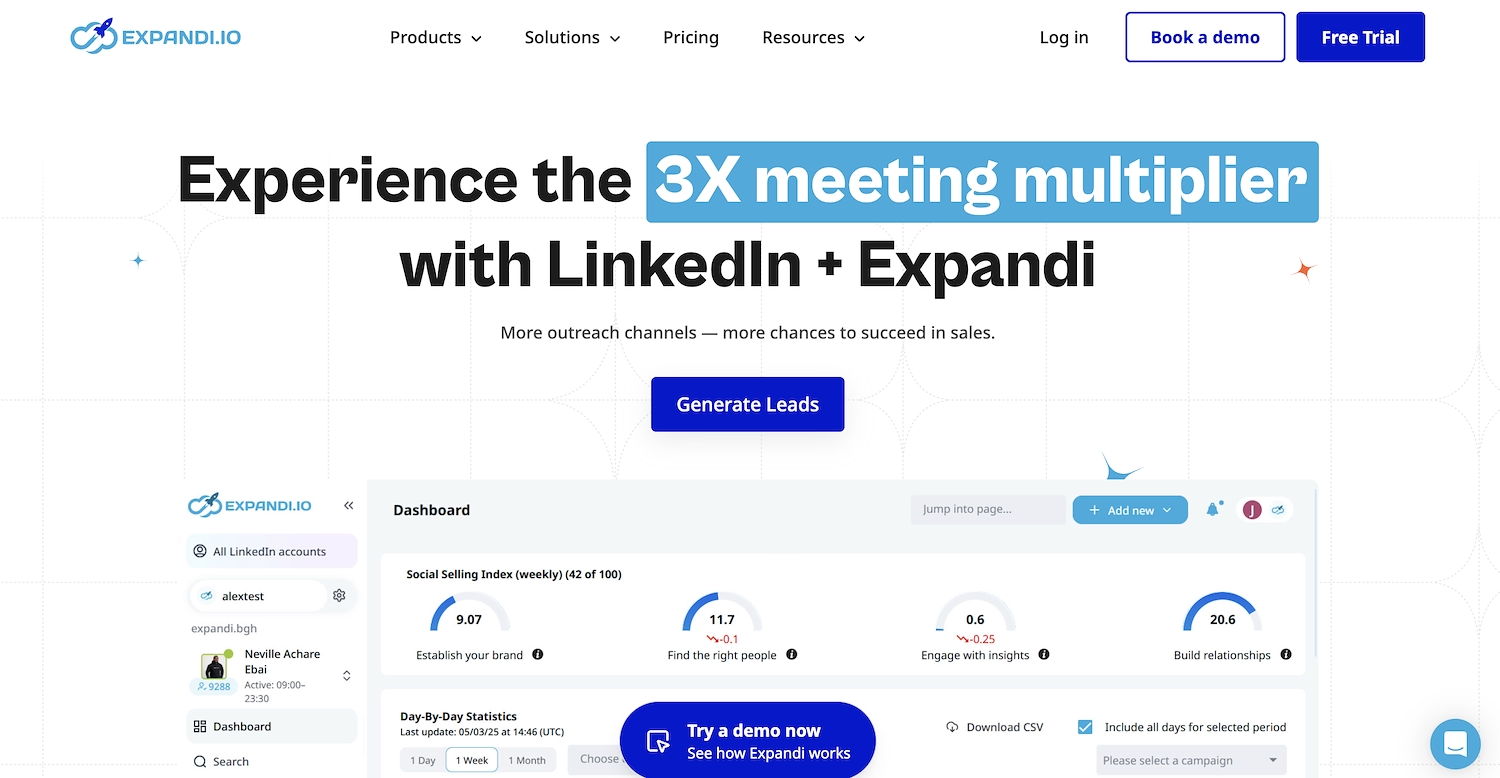
Expandi is a platform for LinkedIn outreach that helps sales teams and agencies automate lead generation. The tool uses automated sequences to connect with prospects and manage social selling campaigns. It operates in a cloud-based environment to run outreach activities.
Expandi's Main Features
- Builds visual drag-and-drop workflows with 10 actions and 10 conditions, including pre-outreach warm-up actions like profile visits and content likes.
- Combines LinkedIn and email outreach into single, multi-touch smart sequences to connect with prospects.
- Inserts dynamic images, videos, and GIFs into messages using direct integrations with Sendspark and Hyperize as a paid add-on.
- Provides workspaces with shared dashboards, roles, and permission management for team and agency collaboration.
How Expandi Compares to Dux-Soup
Average Review score: 4.2/5 stars based on 113 G2 reviews.
- Expandi provides a visual workflow builder with more actions and conditions, which allows for more complex sequences than Dux-Soup's campaign structure.
- It combines LinkedIn and email outreach into a single automated campaign, offering a multi-channel approach that Dux-Soup does not natively support.
- The tool can insert dynamic images and GIFs into messages through integrations, providing more personalization options than the standard text messages in Dux-Soup.
- This platform includes specific automation for LinkedIn events, such as inviting your network or messaging attendees, a feature not found in Dux-Soup.
Where Expandi May Fall Short
- Expandi does not offer a permanent free plan, unlike Dux-Soup's free version for basic automation. This limits the ability to test core functions long-term without a paid subscription.
- User data suggests a longer setup time, with implementation taking around a month. In comparison, Dux-Soup's browser extension can be quicker to deploy for immediate use on LinkedIn profiles.
- The tool operates on a separate cloud platform, so you do not manage tasks directly on LinkedIn pages. This differs from Dux-Soup's extension, which some users prefer for its on-page workflow.
Pricing and Cost-Effectiveness
Dux-Soup’s paid plans are priced at $11.25 for Pro and $41.25 for Turbo per month. Expandi is positioned as a higher-cost alternative; for the most accurate pricing, we recommend visiting Expandi's official website.
7) Dripify
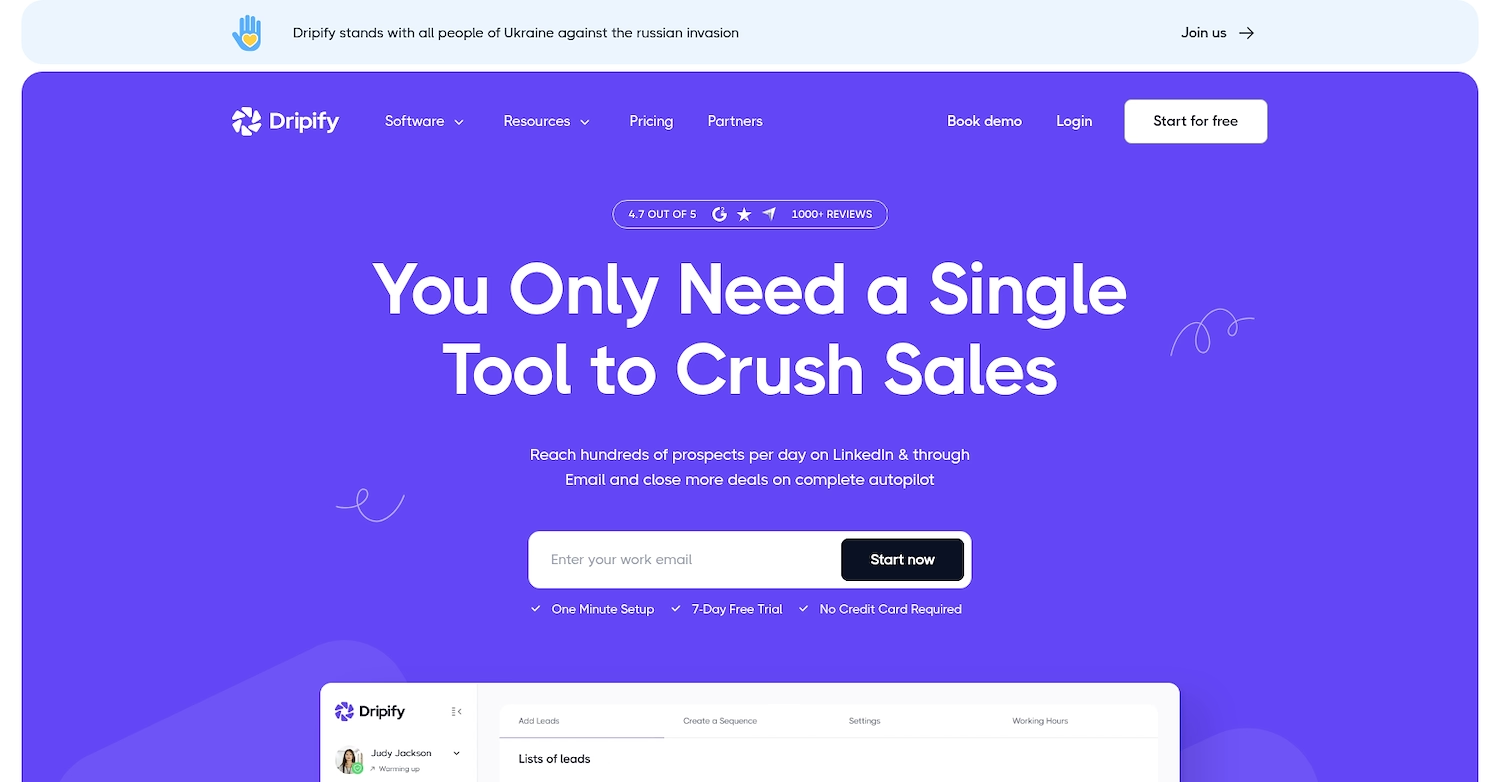
Dripify is a cloud-based LinkedIn automation tool for lead generation. It helps sales teams and marketers create drip campaigns with automated action sequences. The software builds sales funnels to manage outreach and connect with potential clients, which supports social sales efforts on the platform.
Dripify's Main Features
- Builds smart sequences by combining LinkedIn actions with email outreach, delays, and conditions.
- Tests up to four message versions in a campaign to automatically identify the best-performing copy.
- Includes team management features to control permissions and view cross-team analytics.
- Personalizes outreach with over 20 custom variables and an AI-powered icebreaker feature.
How Dripify Compares to Dux-Soup
Average Review score: 4.5/5 stars based on 297 G2 reviews.
- Dripify provides team management features, including performance dashboards and role assignments. This is more suited for team collaboration compared to Dux-Soup, which is often used by individuals.
- It has a built-in A/B testing function to test different message variations. This helps optimize campaigns, a feature not present in Dux-Soup.
- The platform includes a smart inbox to manage all lead conversations in one place. This differs from Dux-Soup, where users typically manage replies directly within LinkedIn.
- Dripify offers an analytics dashboard with metrics like conversion rates. This gives more direct performance data than Dux-Soup, which may require exporting data for similar analysis.
- The tool uses an AI feature to generate personalized icebreakers for messages. This offers a level of message customization that Dux-Soup does not provide.
Where Dripify May Fall Short
- Dripify does not offer a free plan. This differs from Dux-Soup, which provides a free version for users to test basic automation features before a paid commitment.
- Its entry-level pricing is higher compared to Dux-Soup. The Basic plan costs $39 per month, while Dux-Soup's Pro plan is $11.25, which can be a key consideration for users with smaller budgets.
- The tool operates entirely in the cloud, so you manage tasks away from the live LinkedIn interface. Some users may prefer Dux-Soup's browser extension, which allows for direct, on-page management.
Pricing and Cost-Effectiveness
Dripify's pricing starts at $39 per month for its Basic plan and goes up to $79 for the Advanced plan. This makes its entry-level and mid-tier options more expensive than Dux-Soup's Pro ($11.25) and Turbo ($41.25) plans, positioning Dux-Soup as the more cost-effective choice.
8) We-Connect
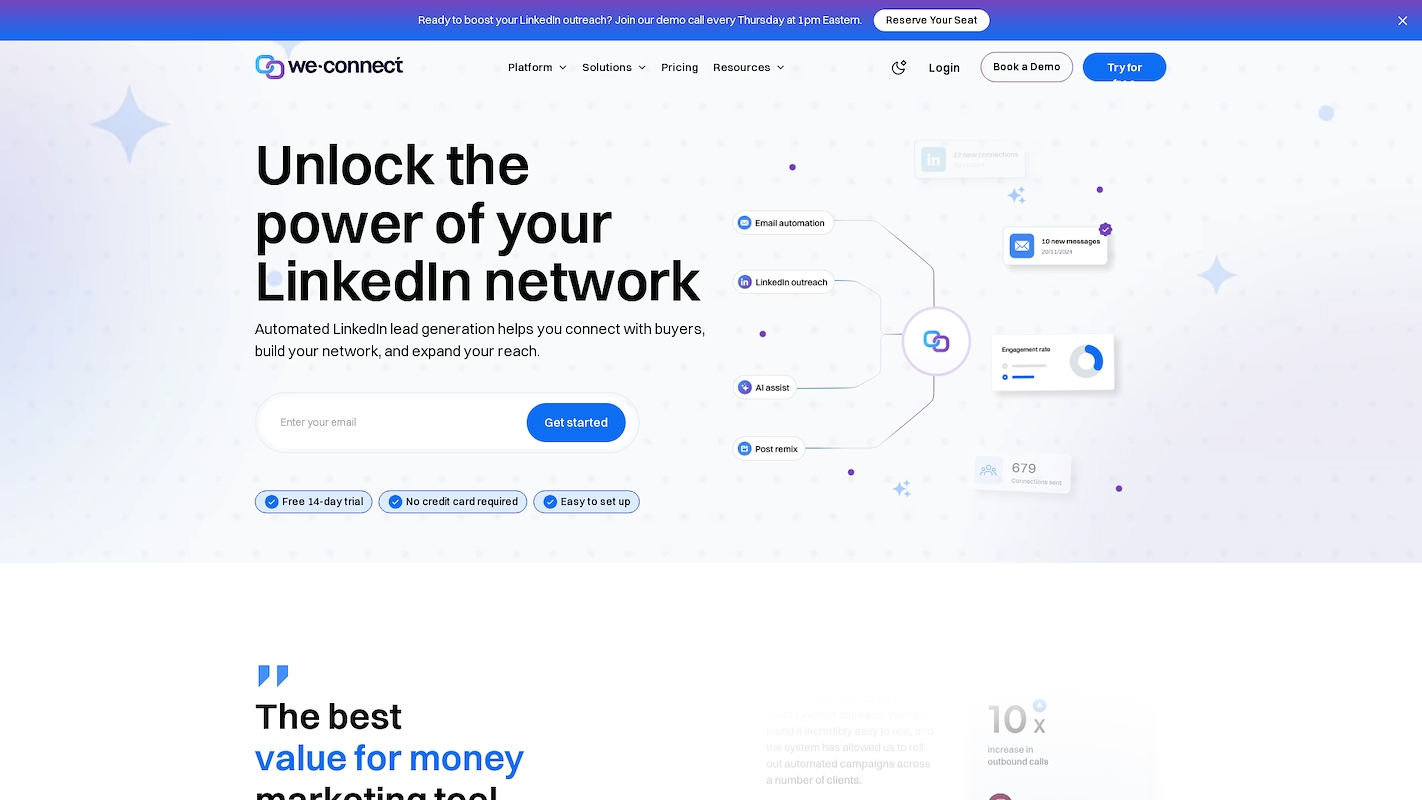
We-Connect is a cloud-based platform for LinkedIn automation. It helps sales teams and agencies with lead generation through automated outreach. The tool allows users to build campaigns, manage prospects, and engage potential clients. It operates in the cloud, so campaigns run continuously without local computer dependency.
We-Connect's Main Features
- Captures lead data using forms.
- Offers mobile capabilities for outreach management.
- Personalizes campaigns with customizable templates.
- Monitors lead activity with built-in analytics and reporting.
How We-Connect Compares To Dux-Soup
Average Review score: 4.6/5 stars based on 83 G2 reviews.
- We-Connect provides mobile capabilities to manage campaigns from anywhere. This offers more flexibility than Dux-Soup, which operates primarily as a desktop tool.
- The platform captures lead data through integrated forms. This is a direct data collection method not available in Dux-Soup, which scrapes profile information.
- Many users find its interface easy to navigate for campaign setup. This presents a different user experience from Dux-Soup, where some users note a more complex workflow.
- The tool includes built-in analytics to monitor lead activity directly. This provides a more integrated performance view compared to Dux-Soup, which can require data exports for similar detailed analysis.
Where We-Connect May Fall Short
- We-Connect does not offer a permanent free plan. This is different from Dux-Soup, which provides a free version to test basic features like profile visits before a user commits to a paid plan.
- The tool operates on a separate cloud platform. This means you do not manage tasks directly on LinkedIn pages, which is different from Dux-Soup's extension that allows for an on-page workflow.
- Some users report occasional slow performance or delays. This might interrupt workflows, which contrasts with Dux-Soup's browser extension model that some find more direct for managing daily tasks on LinkedIn.
- Its entry-level plan is more expensive than Dux-Soup's. The starting price for We-Connect is higher, which can be a key factor for users with smaller budgets compared to Dux-Soup's more affordable Pro plan.
Pricing and Cost-Effectiveness
We-Connect's pricing starts at $69.00 per month for its Starter plan and is $79.00 for its Professional plan. This positions it as a higher-cost option compared to Dux-Soup, whose paid plans begin at $11.25 for Pro and $41.25 for Turbo, making Dux-Soup more accessible for smaller budgets.
9) Salesflow
Salesflow is a cloud-based LinkedIn automation platform for sales teams. It automates outreach to help generate leads and manage prospect engagement. The tool is designed to run campaigns continuously without requiring a local computer or browser to be active.
Salesflow's Main Features
- Creates multi-step outreach campaigns with automated follow-ups.
- Provides team collaboration tools, including a shared dashboard and role management.
- Includes A/B testing to test different message templates for performance.
- Offers a centralized inbox to manage all prospect conversations.
How Salesflow Compares to Dux-Soup
Average Review score: 4.5/5 stars based on 111 G2 reviews.
- Salesflow is built with team collaboration in mind, offering shared dashboards and role management. This provides more structure for teams than Dux-Soup, which is often better suited for individual users.
- It includes native A/B testing for messages. This allows for data-driven campaign optimization, a feature not built into Dux-Soup.
- The platform has a centralized inbox to manage all lead responses. This can be more efficient for teams than managing replies directly in LinkedIn, which is the typical workflow with Dux-Soup.
- Salesflow operates entirely in the cloud, which is standard for all its plans. This is comparable to Dux-Soup's Turbo plan, but not its browser-based Pro plan.
Where Salesflow May Fall Short
- Salesflow does not have a free plan. Dux-Soup offers a free version, which allows users to test basic automation features before committing to a subscription.
- The platform's starting price is higher than Dux-Soup's entry-level plans. This can be a significant factor for small businesses or solo users with limited budgets.
- It operates on a separate platform, so you do not manage tasks directly on LinkedIn pages. Some users may prefer Dux-Soup's browser extension for its on-page workflow.
Pricing and Cost-Effectiveness
Salesflow is a premium-priced tool, with its plan starting at $99 per month. This is considerably higher than Dux-Soup's Pro ($11.25) and Turbo ($41.25) plans, making Dux-Soup a more cost-effective option for users who do not need advanced team features.
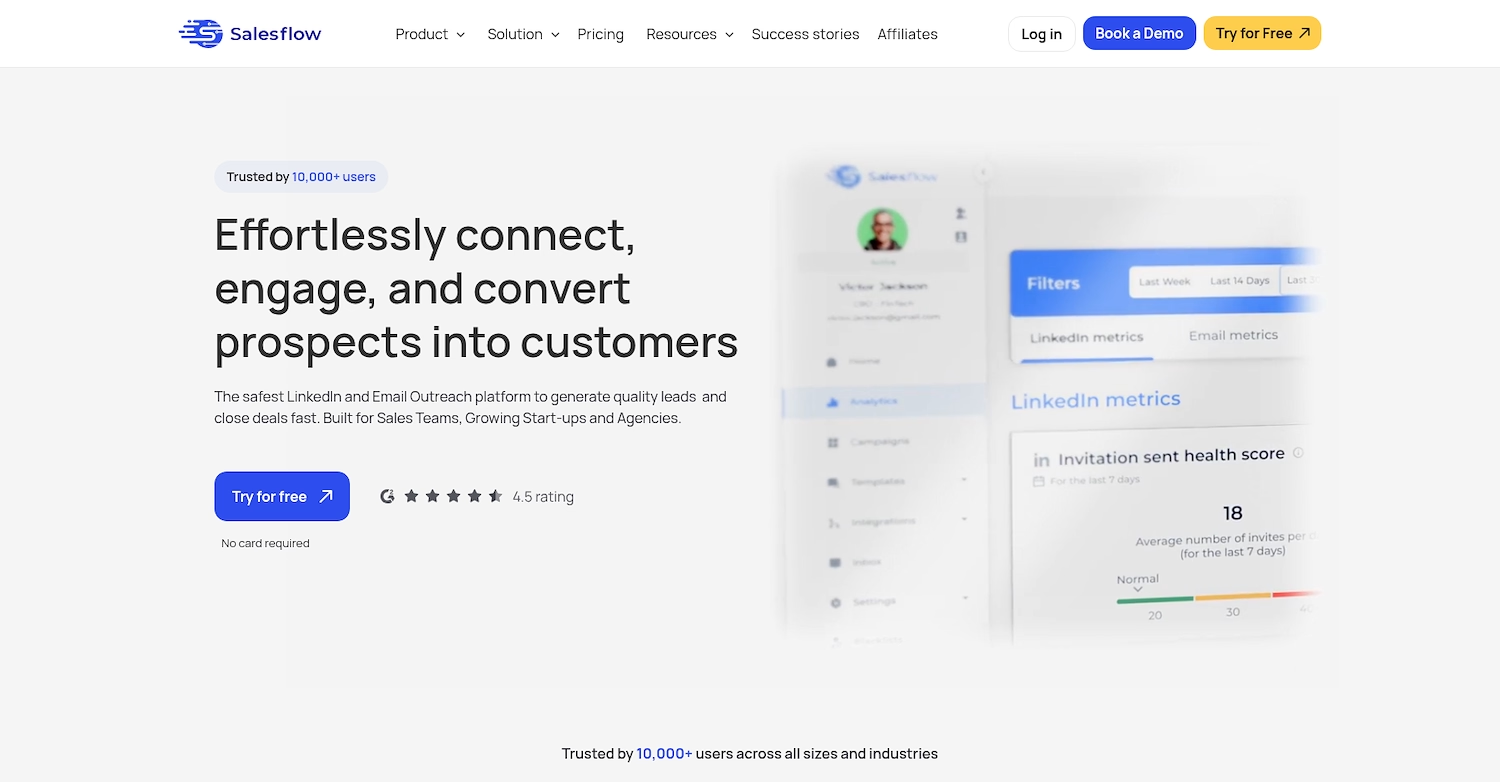
Salesflow is a cloud-based LinkedIn automation platform for sales teams. It automates outreach to generate leads and manage prospect engagement. The tool runs campaigns from the cloud, so a local computer or browser does not need to remain active for consistent outreach on LinkedIn.
Salesflow's Main Features
- Monitors lead activity and performance.
- Captures lead data using forms.
- Provides mobile capabilities for campaign management.
- Includes analytics and reporting with data export and import functions.
How Salesflow Compares To Dux-Soup
Average Review score: 4.3/5 stars based on 132 G2 reviews.
- Salesflow is designed for sales teams and agencies, offering features for collaboration. This is different from Dux-Soup, which is often better suited for individual users.
- It provides mobile capabilities to manage campaigns from a phone. This adds a layer of flexibility not found in the desktop-centric Dux-Soup tool.
- The tool captures lead data using integrated forms. This offers a direct way to collect information, unlike Dux-Soup which relies on scraping data from profiles.
- The platform includes built-in analytics and reporting for performance tracking. This provides a more complete overview compared to Dux-Soup, which may require data exports for detailed analysis.
Where Salesflow May Fall Short
- Some users report that Salesflow can be buggy, which may interrupt daily workflows. In comparison, Dux-Soup's browser extension is often considered more stable for managing tasks directly on LinkedIn pages.
- The tool might sometimes have issues with data accuracy when capturing lead information. Dux-Soup, by contrast, scrapes data directly from visited profiles, which can provide a more direct data set for outreach.
- Its focus on team features can make the platform more complex for individual users. Dux-Soup offers a more straightforward approach that can be easier for solo users to learn for basic automation tasks.
Pricing and Cost-Effectiveness
Salesflow is positioned as a premium tool, with its plan starting at $99 per month. This is considerably higher than Dux-Soup's Pro ($11.25) and Turbo ($41.25) plans, making Dux-Soup a more cost-effective option for users who do not need advanced team features.
10) Skylead
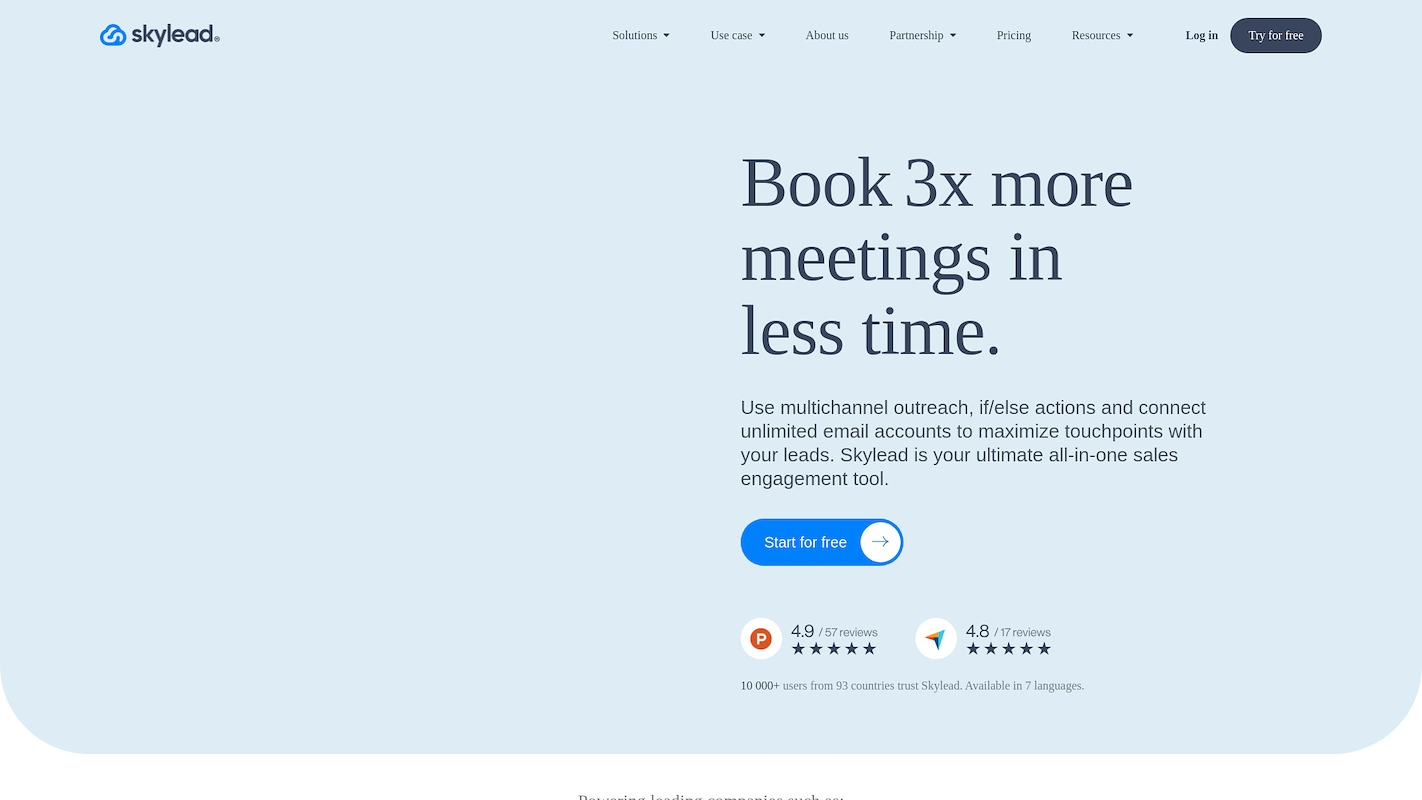
Skylead is a platform for social selling and LinkedIn outreach. As a Dux-Soup alternative, it automates outreach campaigns on the network. Users can manage prospect connections and lead generation efforts. The tool is for sales teams and individuals who seek clients on LinkedIn.
Skylead's Main Features
- Combines LinkedIn and email actions with if/else conditions into a single outreach sequence.
- Discovers and double-verifies business emails to reduce bounce rates for outreach campaigns.
- Inserts personalized images and GIFs into messages to increase engagement.
- Manages lead responses from multiple channels in a unified inbox with labels and saved replies.
How Skylead Compares To Dux-Soup
Average Review score: 4.5/5 stars based on 126 G2 reviews.
- Skylead combines LinkedIn and email actions with if/else conditions into a single sequence. This offers a more flexible, multi-channel path to reach prospects compared to Dux-Soup's LinkedIn-centric campaigns.
- It allows you to insert personalized images and GIFs into messages. This provides a different level of engagement from the standard text-based messages used in Dux-Soup.
- The tool includes a built-in email finder and verifier to discover and check business emails. This is a different approach from Dux-Soup, which focuses on scraping data directly from LinkedIn profiles.
- Skylead provides a unified smart inbox to manage lead responses from multiple channels. This centralizes communication, while Dux-Soup users typically handle replies within LinkedIn's interface.
Where Skylead May Fall Short
- Skylead does not provide a permanent free plan. This differs from Dux-Soup, which has a free version for users to test core functions before committing to a paid plan.
- Its entry-level price is $100 per month, a considerable cost compared to Dux-Soup's $11.25 starting plan. This price point might be less suitable for users with smaller budgets.
- The platform's cloud-based system means you manage campaigns away from the live LinkedIn site. Some users find Dux-Soup's browser extension more direct because it allows for on-page task management.
Pricing and Cost-Effectiveness
Skylead's All-In-One plan is priced at $100 per month. In contrast, Dux-Soup provides more accessible options with its Pro plan at $11.25 and Turbo plan at $41.25 per month. This positions Dux-Soup as a more cost-effective choice for users with smaller budgets or simpler needs.
Which One Should You Go With?
Choosing a Dux-Soup alternative involves many variables, from budget to team size. This guide has presented several options to help you find a tool that aligns with your sales process.
If your sales strategy involves using autonomous agents, 11x offers a platform built for that purpose. It provides a different operational model by using digital workers to manage tasks like prospecting, outreach, and lead qualification.




